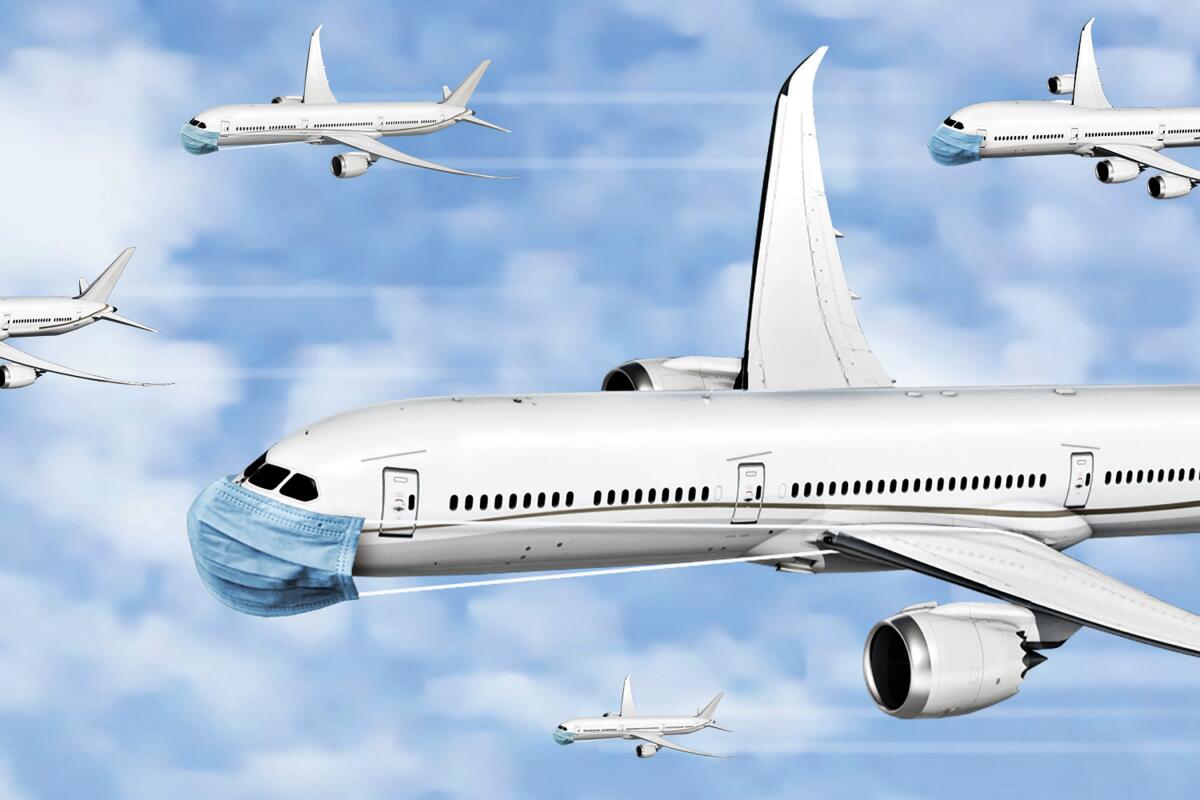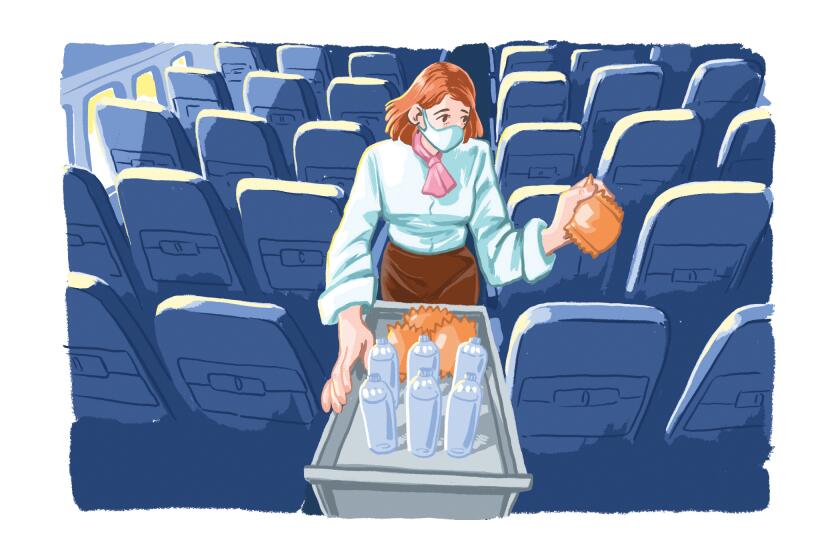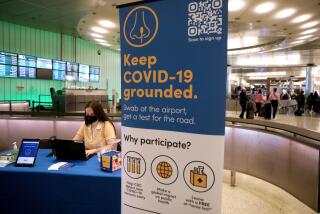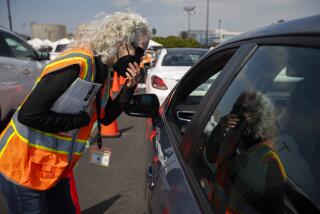I’m a flight attendant. My co-workers are starting to test positive for coronavirus

- Share via
“I tested positive.”
His words hit me like a sucker punch, spoken through a cellphone 3,000 miles away in Los Angeles. My good friend Dan, a fellow flight attendant and longtime travel buddy who had lured me to Buenos Aires, Helsinki and Tallinn, Estonia, had been infected with COVID-19.
I slumped on the sofa in my Fort Lauderdale, Fla., apartment, wondering if I’d heard him correctly.
“Yeah, man,” he said, with a chuckle that belied his predicament. “The CDC just called with my test results. I’ve got coronavirus.”
For more than 35 years Dan and I have worked for the same U.S. airline, a massive international carrier employing more than 25,000 flight attendants. On its employee website, the airline states that approximately 100 flight attendants have tested positive for coronavirus. Paul Frishkorn was one of them. The 65-year-old Philadelphia-based flight attendant died due to complications from COVID-19.
Because of the nature of our job — we make repeated contact with hundreds of people while working in a close environment — recent experience shows the true number of infected flight attendants is almost sure to be much higher.
Social distancing — a term we’ve all become familiar with — has been nearly impossible to accomplish on an airplane. Until now.
Few victims can say precisely when, where or how they contracted COVID-19. But during that phone conversation with Dan, he explained when it probably happened.
The first week of March, he had worked a flight from Los Angeles to Sydney, Australia. During the layover before their return flight, he dined at a restaurant with two other flight attendants — one female and one male. Dinner was unremarkable, save for the fact that the male flight attendant had a nagging cough. His coughing was so persistent that after dinner the trio stopped at a convenience store to purchase cough syrup for him. They then returned to their separate hotel rooms.
On the return flight to Los Angeles the following day, the female flight attendant who had accompanied Dan to dinner fell ill. She developed a cough and complained of feeling “out of it.” None of them considered COVID-19 the culprit. Back then, during the first week of March, most Americans assumed a cough was just a cough — not a symptom of a horrible pandemic. After all, New York had confirmed its first case of COVID-19 just days earlier, on March 1.
So when the plane landed, the three flight attendants went their separate ways.
A couple of days later, Dan received a phone call. It was the female flight attendant phoning to say her condition had deteriorated, and she had been admitted to a Los Angeles hospital. She developed pneumonia. Her breathing became labored. She was moved to the intensive care unit and placed on a ventilator. At some point, she was tested for COVID-19. The results were positive, which is why she implored Dan to get tested.
It’s unclear whether the third crew member tested positive. Or if he had been tested at all. This leads to the scary part: At least two crew members (possibly three) were infected with COVID-19 while working the 14-hour flight from Sydney to Los Angeles. Three pilots, 10 flight attendants and more than 100 passengers shared space on the aircraft. Passengers and crew have been notified, but in the days it took for all to be alerted, the potentially infected had ample time to infect others.
Mindfulness meditation can help provide clarity during anxious moments. Use our tips to stay calm during the coronavirus outbreak and other stressful events.
It’s chilling to learn that someone in your orbit has tested positive for the virus. But that’s what happened in late March to a Miami-based flight attendant. Clark (not his real name; he spoke on the condition of anonymity) received a call from an airline supervisor who said a member of Clark’s crew had tested positive for COVID-19. The supervisor would not reveal the name of the infected crew member, only that the individual had worked with Clark on a flight from Rio de Janeiro a week earlier.
Clark complained of a massive headache, chills and fatigue and felt reasonably certain he had contracted COVID-19, the illness caused by the coronavirus. The last time we spoke, he was arranging to be tested.
Jorge Merelles knew exactly when he contracted COVID-19. On March 15, the 64-year-old Miami-based flight attendant worked a trip from Rio to Miami. Among the passengers, he said, were “more than 70 elderly folks coming back from canceled cruises. Many of them were sick.”
Days later, Jorge was admitted to a Miami hospital, where he spent eight days suffering from fever, headache and body pains. Breathing became difficult for him. He was tested for COVID-19 while hooked up to oxygen equipment and quarantined in a private room. It took more than a week to get the results, which confirmed what he already knew. Jorge was indeed infected.
Down the hall at the same hospital, coronavirus symptoms plagued another Miami-based flight attendant. A week earlier, Benny had worked a flight from São Paulo, Brazil, to Miami. (Two crew members on that same flight also ultimately tested positive.) By the time Benny realized he was symptomatic, his wife and two children had also been infected with COVID-19.
His wife’s illness became so severe that she was admitted to the ICU and was breathing with the aid of a ventilator.
The good news is that Benny and his wife have since been released from the hospital. They are recovering at home, as are their children. Jorge, Clark, my buddy Dan and the female flight attendant who urged him to get tested all are doing better and recovering at home.
And yet, the stories continue. By now, just about every flight attendant knows someone who knows someone who has symptoms of COVID-19. The question on everyone’s mind is when will the stories finally end?
More to Read
Sign up for The Wild
We’ll help you find the best places to hike, bike and run, as well as the perfect silent spots for meditation and yoga.
You may occasionally receive promotional content from the Los Angeles Times.









